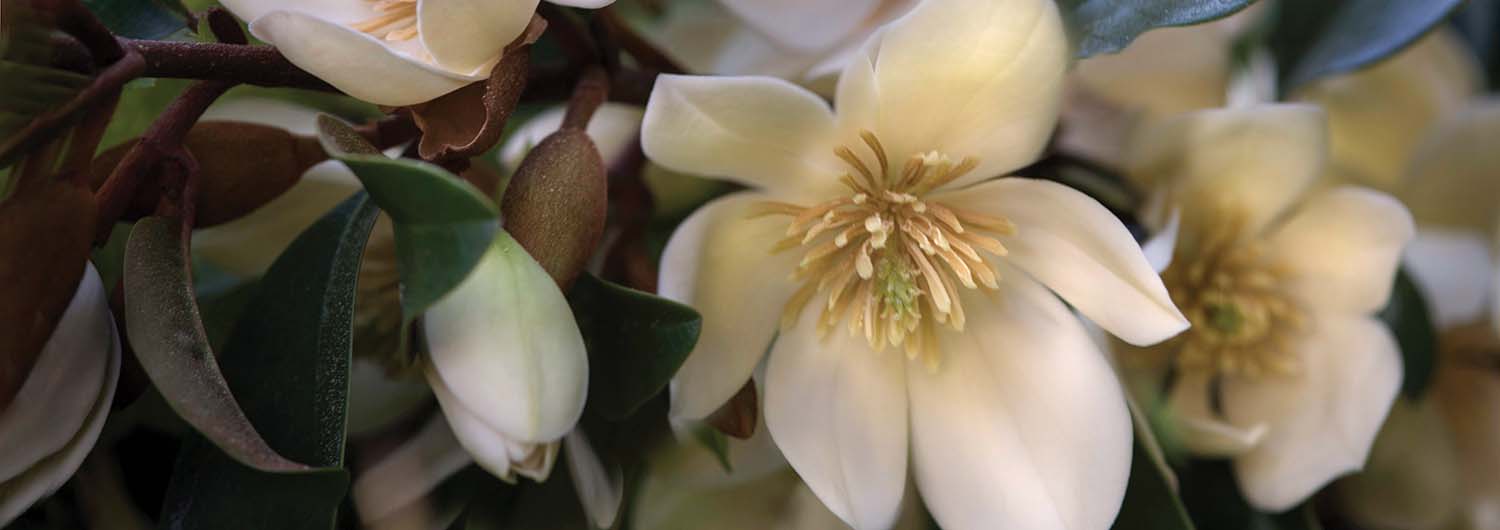Friends of the JC Raulston Arboretum Newsletter
Spring 2022 – Vol. 25, No. 1
Director's Letter
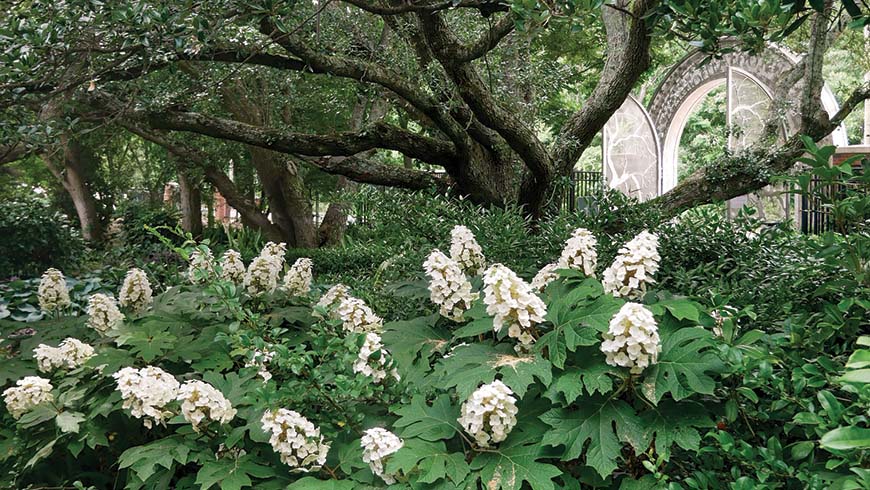
Greetings from the JC Raulston Arboretum
By Mark Weathington, Director
There is nothing quite like the onset of spring to get a gardener's blood pumping. As usual, I'm scrambling to get my home garden ready as it is beginning to really explode into its spring lushness. Here at the Arboretum, the team has the garden well in hand. If you stayed away over the winter, you'll be seeing some new things when you get back out thanks to some generous donations from our supporters. A few highlights include a new arbor at the White Garden end of the Perennial Border and a pair of 800-pound guardian lions protecting Asian Valley where we have removed the old holly hedge and replaced it with a much more refined fence. The latter improvement means increased light and air circulation, which should do wonders for the collection in that area. This year looks to be an even busier one with multiple projects in the works.
We've moved as seamlessly back into in-person programs as we did when making the move to online two years ago with hands-on workshops like winter cutting propagation and grafting classes as well as actual tours. We haven't skimped on our online and hybrid offerings, the February Gardening in the South program had over 700 registrants! Our first major hybrid program was our Winter Symposium, which was a major success as well. The auction was fast and furious. If you missed the program or the auction, make sure to join us for the two-day botanical bonanza that is the Southeastern Plant Symposium. We're bringing in our planned 2020 lineup of speakers and you won't want to miss out on the action.
It's been two long years but the whole JCRA team has been re-energized by seeing so many of you here for our programming, plant sales—did I mention this year's Raulston Blooms! sale on April 29 (member's only) and 30 will be our biggest ever—and just out enjoying the garden. Thank you all for helping us be the best we can.
See you in the garden.
Annual Report
2021 JC Raulston Arboretum Annual Report
There are many people to thank for their support in 2021. In an effort to conserve resources, the full 2021 annual report is offered on the JCRA Web site at https://jcra.ncsu.edu/publications/annual-reports/ instead of printed copies. A few highlights of 2021 are included below.
Horticulture
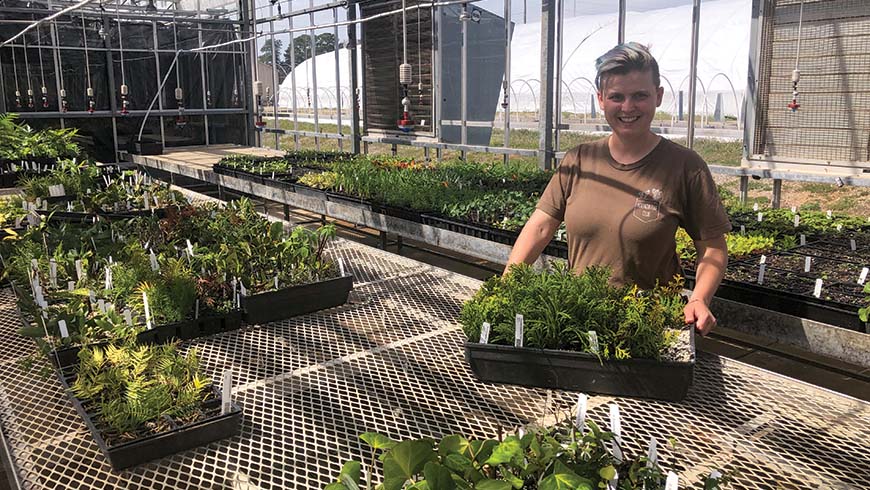
The JCRA's Nursery
By Douglas Ruhren, Gardens Manager
It is a very exciting time at the JC Raulston Arboretum at NC State University. Sophia McCusker (photograph above) was hired to focus on the JCRA nursery. This will free up Arboretum employees who had been dividing their time and attention between the nursery and the actual arboretum to more fully focus on the Arboretum's collections.
If the actual arboretum is the public face of the JCRA, the nursery is the polar opposite, unseen and perhaps even the power behind the throne. The nursery supports the JCRA in many ways, both the plant collection and Arboretum programs.
The JCRA is plant driven. It is a curated collection of plants, which means it is planned, tracked, and documented. Plants are grown primarily to evaluate their suitability to the growing conditions of this area. New plants often spend some time in the nursery before they are planted for a variety of reasons. Many new plants are very small when they arrive so they are grown in the nursery until they are a size more suitable for planting. Others arrive here not as complete plants but as seed, spores, stem cuttings, or other propagules and are grown until they are established. New arrivals of questionable winter-hardiness spend their first winter in the nursery and are planted out come spring so they are as well established as possible before they face their first zone 7b winter. It can also be the case that a garden area is not ready for new plantings so plants remain in the nursery until the garden is ready for them.
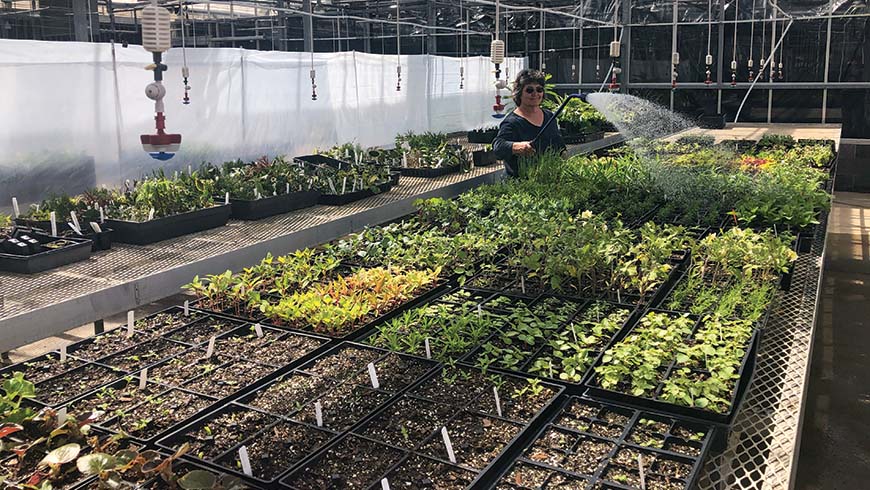
Plant production in the JCRA nursery supports many facets. The Color Trials plants arrive in the winter or very early spring sometimes as seed, very rarely as cuttings, and most often as tiny plugs, all of which need to be grown on to a plantable size by Bernadette Clark (photograph above) before being planted in the trials beds.
The Friends of the Arboretum Annual Plant Distribution is an event loved by many members and an important driver of membership. A minimum of four thousand plants, most grown in our nursery, are given away in 10 minutes on the first Saturday in October. (Watch the YouTube video if you have never attended. It's amazing and amazingly free of bloodshed.)
About six thousand plants last year were sold on the Plant Sale Buggy, and it was a year that started with the Arboretum still closed due to the pandemic. Most of these are propagated by JCRA staff and volunteers and grown in the nursery. It is a significant source of income, and the JCRA raises over 85% of what it takes to run this place. (Visitors are often surprised to learn that the JCRA is not part of Raleigh's Parks, Recreation and Cultural Resources department.)
Plant sales, both online and in person such as Raulston Blooms!, are a combination of plants grown here, purchased plants, and donated plants. It only seemed logical to propagate some of the many choice plants in the JCRA collection that are not readily available. This serves the dual purpose of distributing good plants and generating income.
Sometimes, plants in the JCRA are of botanical interest only yet represent significant genetics that are important enough to share with other public gardens that focus on preserving genetic diversity. For example, the JCRA recently participated in a multi-garden project to propagate some of the rarest magnolia species through grafting.
Plants are often produced to support the various educational programs, both child and adult. A hardwood cutting propagation workshop held in January filled the mist bench in the nursery with flats of cuttings which will eventually go home with the participants and Japanese maple seedlings in the nursery were used as understock for a Japanese maple grafting workshop in February.
Sometimes, the nursery is the primary, long-term location for some plant collections. In 2020, Mark Weathington started the koten engei plant collection and though individual specimens of these horticultural gems will be displayed in the Arboretum on a rotating basis, they will primarily live in the nursery.
These are some of the ways in which the JCRA nursery supports the JCRA plantings, collections, and programs. Perhaps it is easy to imagine that this is enough to keep one full-time employee busy. It is. However, it must also be mentioned that as with nearly all things JCRA, much is accomplished with help of a host of angels (otherwise known as volunteers).
With the addition of a full-time nursery manager, other employees will be able to more fully focus on the Arboretum itself. So what will this mean to the Arboretum you visit?
There is a backlog of plants in the nursery waiting to be planted. With the addition of a new nursery staff member, the garden staff can spend more time planting which will free up more room in the nursery for new plants.
The garden staff can now focus more on existing plant collections. At times, this might mean the elimination of some plants. It is essential for all that have any relationship to the JCRA to remember that it was never the intention that the JCRA be the permanent holder of any collection of plants. The modus operandi is more like been there, done that, move on, eliminate the old, and plant something new.
Garden maintenance will improve, too. This not only includes plant care, but also the maintenance of garden structures, benches, paths, and so much more.
More staff also means that we have more time to work with additional volunteers working in the gardens and providing more educational opportunities.
Contemplating all of the possibilities is almost enough to cause one's head to explode. These are indeed exciting times at the JCRA. As always; thanks to all of you who help to make this possible and we hope you'll be part of our exciting future.
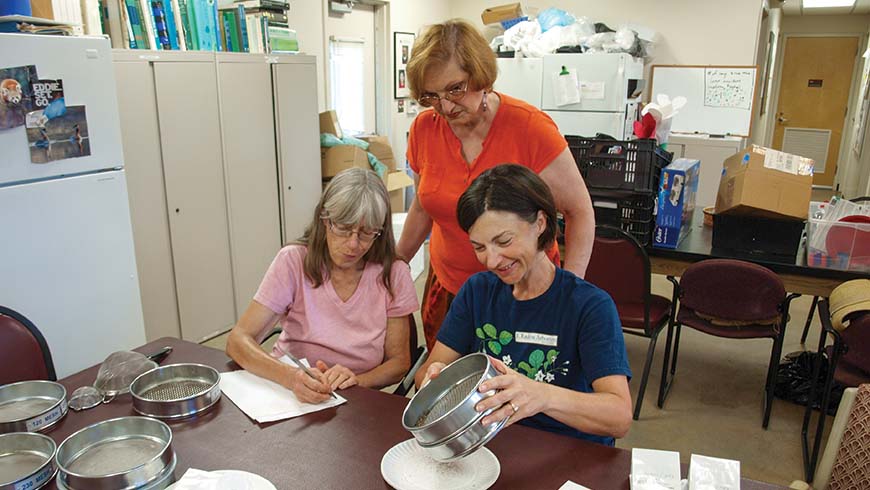
Seed Sharing (in Latin)
By Dennis Carey, Curator
Botanic gardens have a quirky yet valuable practice of sharing seeds with each other. Quirky because we write our seed catalog and seed order form in Latin. We call the seed catalog an index seminum (translation: list of seeds) and we call the seed order form a desiderata (translation: desired). This practice is valuable because it is an excellent way to acquire esoteric species from all corners of the planet … taxa that are not commonly used in the horticultural trade and that may be hard to get hold of through normal channels. Why Latin, you may be asking? Because Latin is the lingua franca of the plant nerd (oops, I meant … botany) world and allows us to communicate relatively effectively all over the planet no matter what language we speak.
The JC Raulston Arboretum has produced many index semina (plural of seminum) over the years. Once per year, we publish our index seminum and share it with all of our botanic garden buddies. In the past, the index seminum was a printed document sent via the mail (just like a Burpee's catalog), but as technology has advanced, we have switched over to an electronic index seminum. We share this resource as a Google Form, which is a faster, cheaper, and easier method of sharing and collecting data.
The JCRA Index Seminum typically has 150 to 300 different taxa in it, all of which are gathered from our collections. In recent years, the JCRA has teamed up with the Juniper Level Botanic Garden to create a combined JCRA/JLBG index seminum. We have a wonderful crew of volunteers, led by Mary Leonhardi, who comes out to the JCRA every Friday to spend a few hours collecting, cleaning, recording, and storing the seeds in paper coin envelopes all to prepare for the next index seminum.
In January 2022, we produced our latest index seminum and e-mailed it out to well over 100 different botanic gardens around the world. From this, we expect to receive around 35 desiderata. The ordering process was closed in mid-February and we held a seed packing party shortly thereafter. The seed collection volunteers, JCRA/JLBG staff, and any other interested parties came out to the Ruby C. McSwain Education Center's York Auditorium, divvied up the seed into individual packets, and stuffed them into mailers. Last year, we sent seed all over the United States as well as to a few places in Canada and several European countries.
The JC Raulston Arboretum also receives index seminum from a few dozen gardens in exotic places including Germany, Romania, Latvia, Russia, Norway, Czech Republic, Canada, and of course, the United States. JCRA volunteer Ken Traynham does a great job keeping all of these incoming seeds categorized for us. We usually receive and sow a few hundred taxa per year. Many of these seedlings end up in the garden and we try to share the extra seedlings with our members via our Plant Sale Buggy and our member plant distributions.
This year, we are trying something new and exciting. We created a JCRA members-only index seminum! The program was announced to all members by e-mail on Friday, March 25. By the end of the first weekend, we received nearly 600 seed requests. Join today to be eligible for this cool opportunity and tell all of your friends!
If you are interested in joining the seed collection volunteers or helping with seed packing, please contact Kathryn Wall at (919) 513-7004 or kbwall@ncsu.edu, and she will organize the groups.
Arboretum Updates

Raulston Blooms!
By Emma Carter, Rental Assistant
The JCRA is thrilled to announce the long-awaited return of our annual spring festival, Raulston Blooms! We have certainly missed this annual staple over the last two years. While we sincerely thank you for your continued support of the Arboretum through online plant sales, we look forward to being able to come together again as a community!
We warmly invite all friends and family to join us on Saturday, April 30 for a lively day of celebration, featuring our extraordinary Spring Plant Sale, 20th Annual Birdhouse Competition, and an exciting array of garden festivities for all ages, including:
- Talks and Q&A sessions with expert horticulturists
- A second-hand gardening book sale
- Educational displays and interactive demonstrations from community groups
- Sales from talented local artists and crafters
- Hands-on, nature-inspired activities for family fun
- On-site food vendors—including NC State's own Howling Cow ice cream!
The festival will run from 10:00 am to 4:00 pm, and a detailed schedule of events can be found on our Web site at https://jcra.ncsu.edu/raulston-blooms/. Attendance is free for members and college students with a valid university ID, $5.00 for non-members, and $10.00 for family groups. Tickets are available for purchase the day of the event at the entrance to the Arboretum and include admission to both the plant sale and the birdhouse competition. Proceeds from this event will benefit the daily operations of the JC Raulston Arboretum.
JCRA members will get exclusive early access to the plant sale on Friday, April 29 before it opens to the public. Be sure to take advantage of this awesome member benefit and get first pick from a wide variety of unusual plants!
Get your birdhouses ready! If you are interested in participating in the 20th Annual Birdhouse Competition, check out the JCRA's Web site at https://jcra.ncsu.edu/birdhouses/. The competition is open to all ages and everyone who enters will receive free admission into Raulston Blooms! Adult competitors (ages 17 and up) may enter their creations under either the Serious category for more functional creations or the Flight of Fancy category for decorative entries. Youth competitors (ages 4 to 16) will be separated into categories by age range (4–6, 7–9, 10–12, and 13–16). Participants may submit as many entries as they would like; there is no limit. We are so excited to see what you create!
The Arboretum team is hard at work planning for this fantastic event, but in the meantime, we hope to see you around the gardens or at one of our upcoming educational events—online or in person. Feel free to reach out to our team at jcra-events@ncsu.edu if you have any questions. We hope to see you there!
JC Raulston Arboretum Members-only Preview Plant Sale
Friday, April 29
4:00 pm–7:00 pm
Tired of winter? Ready for spring? We are and we're kicking the season off right with our biggest ever selection of hot new introductions, reliable performers, and hard to find specialty plants.

Congratulations, Bob Lyons
By Christopher Todd Glenn, Programs and Education Coordinator
The 2022 Scott medal and Award was presented to Robert (Bob) Lyons,Ph.D., at the Scott Arboretum of Swarthmore College's Spring Celebration on March 13, 2022.
According to the Scott Arboretum's Web site, the Scott Medal and Award is given annually, with few exceptions, to an individual, organization or corporate body who "has made an outstanding national contribution to the science and the art of gardening." The purpose of the award is "to promote a greater love of nature, make the nation more conscious of the beauty of the outdoors, develop a greater knowledge and love of plants and flowers, spread the gospel of better planting and designing, and arouse a wider interest in better planting and more beautiful gardens among all citizens." Bob joins a long list of notable horticulturists, including Thomas Ranney, Ph.D.; Richard Birr; and J. C. Raulston, Ph.D., who have received the award over the last nearly 100 years.
Bob Lyons was the JC Raulston Arboretum's second director. Bryce Lane, the Arboretum's interim director after J. C. Raulston's death in December 1996, announced that Bob Lyons was named the Arboretum's new director after a lengthy search in the fall of 1998. In that announcement, Bryce wrote that Bob is a "premier teacher, dearly loved by his students, and recognized by his university." During his time at the JCRA, Bob oversaw many changes that continue to have significant impacts today. The biggest of which in both size and importance was the construction of the Ruby C. McSwain Education Center, Visitor Center, and Staff Building. The completion of these buildings meant that the entire staff would all be located on-site for the first time ever allowing for greater collaboration. Bob also expanded the Arboretum's staff bringing in new talent including the hiring of the first assistant director, Todd Lasseigne, Ph.D.
Bob studied biology at Rutgers University in New Jersey where he received his bachelor's degree. He then continued his education at the University of Minnesota where he received his master's and doctoral degrees in horticulture. He joined the faculty at Virginia Tech in 1981 and rose the ranks to a full professor in 1995. While there, he helped start the Horticulture Gardens at Virginia Tech in 1983 and was named its first director in 1994.
Bob left the JC Raulston Arboretum at the end of 2004 to become the director of the Longwood Graduate Program and professor at the University of Delaware. The program was an educational partnership between Longwood Gardens and the University of Delaware that trained future public horticulture leaders. Students studied public garden management and earned a master's degree in public horticulture.
The Scott Medal and Award is the latest of many awards and accomplishments in a career that spans more than 40 years. Congratulations, Bob!
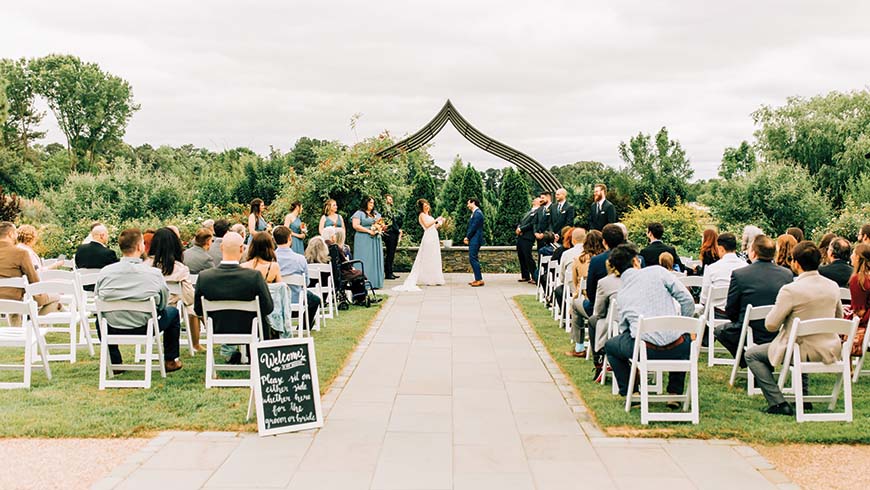
Weddings in the Garden
By Amanda Pattilo-Lunt, Rental Coordinator
Wedding and party season is upon us! After a quiet 2020 and 2021, we have taken 2022 by storm. People are longing for community and a chance to gather and share in each other's company. Brides who have been delaying their celebrations are ready to finally choose a date and get the show on the road. Here at the Arboretum, we are already seeing weekends in 2022 and 2023 fill up with weddings, anniversaries, private parties, quinceañeras, celebrations, and vow renewals.
If you are looking for an outdoor venue in Raleigh, consider renting space in one of our gardens! The natural beauty of the gardens means less time and energy spent decorating. Wedding trends for 2022 are predicting a big increase in vibrant and bold color palettes, which we have in spades! Here are a few garden venues that we love to highlight:
Klein-Pringle White Garden
Classic, iconic, fairytale-esque. We love this garden for weddings and engagements alike. The gazebo makes for a prime engagement photo shoot location. The White Garden is so versatile and offers two unique perspectives. Couples looking for a classic aesthetic can angle toward the gazebo. Couples looking for more of a natural boho aesthetic can angle themselves toward the beautiful arch on the opposite side. Either option is sure to stun and wow your guests.
Finley-Nottingham Rose Garden
Dramatic, romantic, showstopper. The stunning aisle, huge Venetian arch, and, of course the roses, create the most Instagrammable setting. Plus, if you happen to select a date when the Color Trials are in full bloom, you will have an incredible and unique backdrop highlighting thousands of the newest annuals and perennials from around the world.
Japanese Garden
Intimate, elegant, serene. If you are planning a small gathering for your closest friends and family, take a look at the Japanese Garden. It's truly ideal for the most intimate of ceremonies and celebrations. The Zen garden of raked gravel and the huge Japanese crepe myrtle provide an unforgettable backdrop.
We may be biased, but we think we're one of the best places to take pictures in Raleigh! And, those gardens are just some of our lovely outdoor venues. Maybe the A. E. Finley Foundation Rooftop Terrace or the Great Lawn is better suited for your dream event. If you can't decide, why not schedule a site visit with us? Let's walk around together and talk about your vision. We would be happy to help you find the perfect venue. Our rental calendar can be found on the JCRA's Web site at https://jcra.ncsu.edu/rentals/availability-calendar/, or contact us at jcrarentals@ncsu.edu. We are so excited to be a part of your special days.
Development
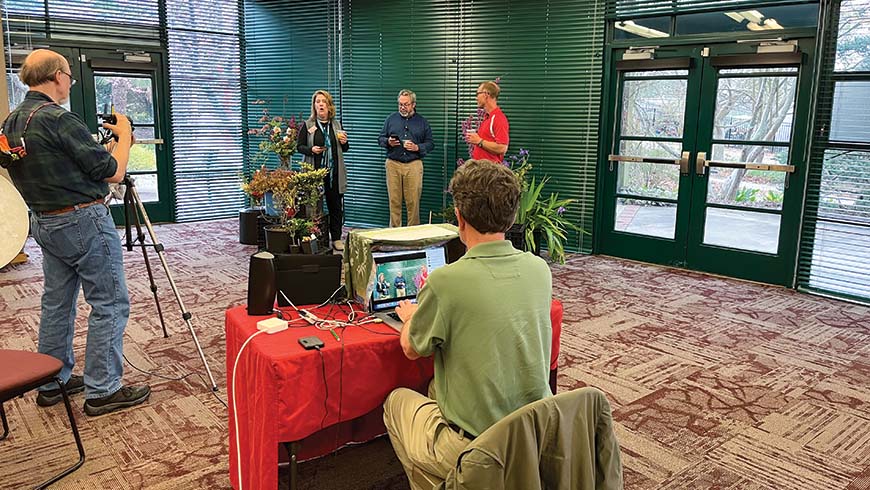
Day of Giving
By Carly Dressen, Development Assistant
A big thank you to everyone who donated and joined us for NC State's fourth annual Day of Giving! For the second year in a row, the JCRA Advisory Board announced a challenge asking our supporters to make 101 gifts to the General Fund and they would donate an additional $20,000. Similar to last year, we asked if you could help us double our impact and reach more than 202 gifts and you did it again! Your generosity raised more than $60,000 for the JCRA General Fund in a 24-hour period!
The JCRA staff brought us a fun-filled day of an expanded midweek program filled with several special guests. As Day of Giving grows, our supporters continue to set the example and show just how strong the reach of the JCRA and our mission truly is!
In addition to the over 202 gifts made, the JCRA also received a $1,000,000 planned gift to support the future of the JC Raulston Arboretum. A $20,000 bequest was also made to support the Juniper Level Botanic Garden Endowment. We have much to celebrate and we are grateful for the many gifts in support of Juniper Level Botanic Garden.
For the first time, with a gift of $25,000, the Southeastern Plant Symposium (June 10 and 11, 2022) will be presented by Proven Winners ColorChoice Flowering Shrubs. We are excited about this new opportunity for an innovative symposium that is only possible through the support of our fellow horticulturists. If interested, there are still several opportunities to join in as a sponsor of the Southeastern Plant Symposium.
Every gift tells a story and we are grateful to everyone for #GivingPack, as we wouldn't be where we are today without donors like you!
Volunteering
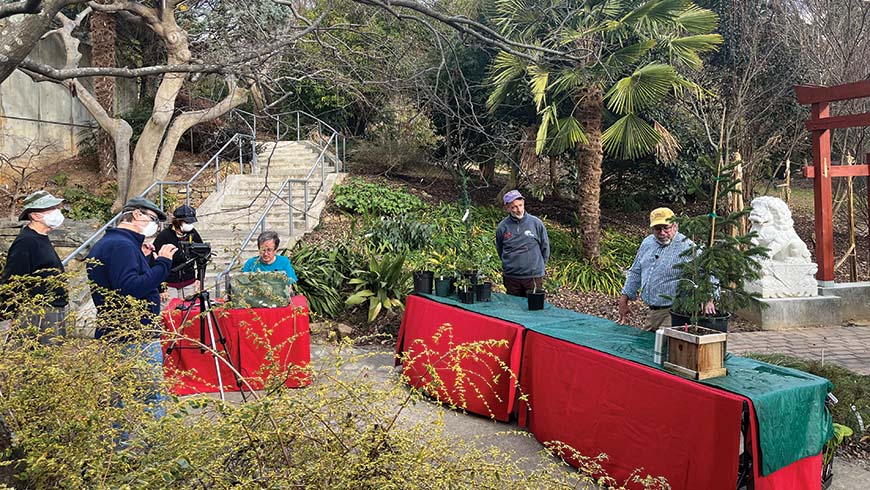
Behind the Scenes: Midweek Tech Crew Volunteers
By Kathryn Wall, Membership and Volunteer Manager
Each Wednesday at 3:00 pm, hundreds of people tune in via Zoom for our popular midweek programming. What started as a modest PowerPoint presentation shared via Zoom in April 2020, has turned into a broadcast production with audio/video equipment carried around the JCRA's grounds. Having the technology to make these programs possible is great, but having a skilled team that knows how to use that tech has been crucial.
We've learned a lot as we've experimented with broadcasting from within the garden. How is it possible to do this week after week? A lot of the technical wizardry comes from Chris Glenn, the host for almost every online program we offer, but he has some great help. Meet the JCRA volunteers behind the scenes to hear about what they love and some of the interesting things they've experienced!
Alexander Lawrence helps the JCRA crew find and operate the best tech. Previously, Alexander owned a business filming events and weddings. As an avid photographer, he is often behind the camera and has also documented the process to ensure sustainability as we look for more volunteers. Alexander says getting to work with presenters to produce the best experience for those watching and listening online is the ultimate goal that requires flexibility and imagination. Because these aren't scripted presentations, creative suggestions and ideas that we throw out are often used by Chris and whoever is presenting.
Carol Lawrence began helping move tables, setting up gear, and occasionally protecting the equipment by holding a carefully placed umbrella! Carol recalls a mud puddle that the crew waded through in the Color Trials, cold wet water splashing up to the knees, as the tech team followed the presenters. (They didn't miss the camera shot!)
Professional photographer, Jeanne Wilkinson, has taken her turns behind the camera. She says the topics are always extremely interesting, and all of the staff and speakers are amazingly knowledgeable. She says Chris is a joy to work with and she enjoys learning a whole lot from him technically.
Lise Jenkins, Ed.D., a Durham County Master Gardener Volunteer with a background in educational technology and podcast development, is amazed by how much programming we can do with materials carried around the garden in a cardboard box! The box does double duty as a sun shield for the laptop on sunny days. We're a resourceful bunch!
All our volunteers agree that they have the "best seats in the house" for the programs! And they get very excited when we share the online numbers for the session. They love to see more people learning about JCRA and our beautiful collections.
(66612).jpg)
Southeastern Plant Symposium
Presented by Proven Winners ColorChoice Flowering Shrubs
Hosted by the JC Raulston Arboretum and Juniper Level Botanic Garden
Friday and Saturday, June 10 and 11
Calling all plantaholics, plant nerds, nurserymen, gardeners, and horticulturists! We are thrilled to announce the fourth annual JC Raulston Arboretum and Juniper Level Botanic Garden Southeastern Plant Symposium. Join us for two very full days of plant lust as we host the best of the best to talk about cutting-edge plants. We've got plant explorers, plant breeders, nurserymen, and other experts for a two-day deep dive into what's new and exciting in the plant world. What could be better than great lectures and mingling with your fellow horti-thusiasts? How about a chance to get your hands on some of the most exciting plants during the completely mind-numbing, fever-inducing silent auction. This is the one garden event that you definitely don't want to miss!

